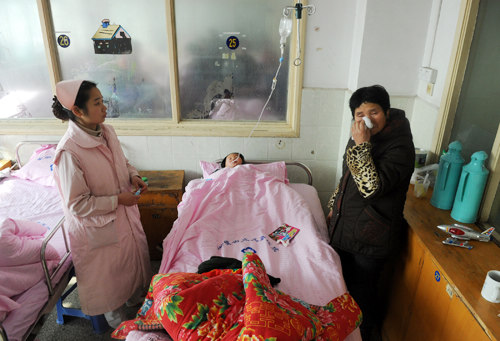|
 |
|
A BLOODY TRAGEDY: A child is treated at the Anhui Provincial Children's Hospital in Hefei on January 6, 2011. More than 200 children were sickened by battery factory emissions in the province with lead poisoning (GUO CHEN) |
The incident was part of a much wider problem with vast tracts of land on the banks of the Xiangjiang River in Hunan found to be riddled with pollutants. People eating rice and vegetables grown on this land regularly succumbed to illnesses or contracted cancers.
Hunan is known for its huge deposits of nonferrous metals in China. But a lack of regulation and environmental consciousness means that the expanding production of nonferrous metals is turning out to be a major source of toxic pollution in the province.
The Xiangjiang River, which supports 60 percent of the province's population and 70 percent of its industrial output, has become one of the country's most polluted rivers.
The poisoning of Xinma villagers and the degradation of their land by pollutants is just one example of a widespread problem affecting swathes of land.
"Pollution has been around for a long time but a lot of incidents have been concealed," said Chen Tongbin, Director of the Research Center of Environment Restoration at the Chinese Academy of Sciences (CAS).
Chen said that heavy metal pollution is more acute in south China where mining is prevalent. "Heavy metals not only pollute the soil, they also poison rice paddies, especially in Hunan and Jiangxi provinces," he said.
According to data from the CAS, 715,000 hectares of land in Hunan, or roughly 3.4 percent of the province's total area, is contaminated by heavy metals.
Another study conducted by the Ministry of Land and Resources in Hunan identified elevated levels of heavy metals in a 250 km by 10 km belt adjacent to the Dongting Lake, China's second largest freshwater lake. Nearby crops, reeds and shellfish were found to have been contaminated by cancer-causing cadmium.
"Over the entire country, more than 10 million hectares of arable land, accounting for 8.3 percent of the country's total surface area, have been polluted by heavy metals," said Minister Zhou, adding that the pollution has wreaked havoc in areas such as the Yangtze River Delta, the Pearl River Delta, and also in Beijing, Tianjin and Hebei Province in north China.
In February 2011, the Nanjing Agricultural University released results of a survey, revealing that about 10 percent of the rice sold in some regions was contaminated with cadmium.
Wang Zuwei, a professor at the College of Urban and Environment Science at Tianjin Normal University, said that cadmium, chromium and arsenic were the major pollutants found in China's farmland.
In addition to widespread ill health, the pollution leads to a reduction in grain production. According to the Ministry of Land and Resources, heavy metal pollution results in a loss of more than 12 million tons of grain annually, causing direct economic losses of 20 billion yuan ($3.17 billion) every year.
Zou Ji, Vice Dean of the School of Environment and Natural Resources at the Renmin University of China in Beijing, said that because heavy metals in soil do not decay over time and cannot be removed like organic pollutants, scientists have not yet found an economically viable means of converting heavily polluted land into arable land.
"After frequent consumption of poisonous food, heavy metals will accumulate in the human body and cause a series of ailments, which are irreversible," Zou said.
Despite this, heavy metal-related pollution has not yet been taken seriously in some places. Though the pollution is invisible to the public in its primary stages, Zhou Xinxin, Deputy Director of the Hubei Provincial Bureau of Environmental Protection, said that the worsening situation should be mainly blamed on the inaction of some officials who put economic growth figures ahead of environmental protection.
Media reports in June 2010 said that the government of Leiyang, a city in Hunan, failed to shut down a number of illegal smelting operations that were producing heavy metal pollution, in defiance of repeated orders from provincial authorities.
| 